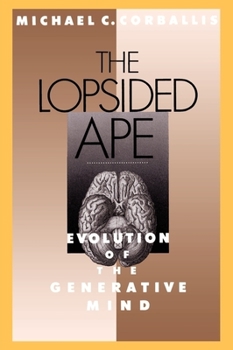The Lopsided Ape: Evolution of the Generative Mind
Select Format
Select Condition 
Book Overview
What is it that allows human beings to think the way we do? What enables us to communicate with one another through the use of speech? Is the difference between Homo sapiens and other apes simply a matter of degree or are we unique and discontinuous from other species? Michael C. Corballis argues that this century-old debate lies in the fact that humans are the only primates that are predominantly right-handed, a sign of the specialization of the left hemisphere of the brain for language. He attributes humans' unique abilities to a biological mechanism in the left hemisphere of the brain called a "generative learning device" or GAD. The GAD, Corballis contends, enables us to generate a limitless number of forms and meanings from a few parsed elements, providing the basis for language and manufacture as well as mathematics, reasoning, art, music, and play. Surveying the current views of evolution using evidence from archeology, linguistics, neurology, and genetics, Corballis takes us on a fascinating tour of the origins and implications of the structure of the human brain accounting for the dominance of humanity over all species.
Format:Paperback
Language:English
ISBN:0195083520
ISBN13:9780195083521
Release Date:June 1993
Publisher:Oxford University Press
Length:384 Pages
Weight:1.20 lbs.
Dimensions:0.7" x 6.2" x 9.2"
Customer Reviews
2 ratings
Right-handedness and language
Published by Thriftbooks.com User , 20 years ago
Most people are right-handed, though with a substantial minority of left-handers: this is such a familiar feature of human existence that we rarely think about it at all (especially if we are right-handed), and now that schools no longer try to force left-handers to write with the right hand, the psychological and emotional problems that this once produced have become a distant memory. Michael Corballis, however, thinks about handedness a great deal, and has devoted a large part of his career as a professor of psychology to studying it. Because we don't think about it much at all, we don't usually notice that bias towards right-handness is a specifically human characteristic. Although animals may prefer to do some actions with one foot rather than the other, they show no consistent bias. To find a comparable case we need to go as far afield as to parrots, which generally prefer to pick up bits of food with their left feet, while standing on their right. I usually regard discussion left-brain and right-brain specialization as the sort of science that belongs in popular magazines, to be read, perhaps, while waiting for a dental appointment, but otherwise to be treated with the same disdain as signs of the zodiac. Unlike signs of the zodiac, however, lateral specialization of the brain has a perfectly serious aspect, and Corballis makes a strong case that strong handedness in humans is related to an apparently quite different special characteristic of humans, their capacity for language.
Why people have right/left hemisphere preferences.
Published by Thriftbooks.com User , 25 years ago
This is a wonderful book and a really stimulating read. It's beautifully written and researched ( hundreds of references) and tells the story of the evolution of language from the time of its appearance among the earliest humans.It shows how the overwhelming importance of speech has moulded the brain and it draws on evidence from the fossil record, DNA analysis, phases of reaching maturity, anatomy, experimental evidence and the greater or lesser role that genes play with respect to culture and learning.The book has changed my way of looking at these things.





